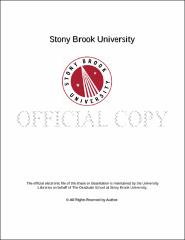| dc.identifier.uri | http://hdl.handle.net/11401/77711 | |
| dc.description.sponsorship | This work is sponsored by the Stony Brook University Graduate School in compliance with the requirements for completion of degree. | en_US |
| dc.format | Monograph | |
| dc.format.medium | Electronic Resource | en_US |
| dc.language.iso | en_US | |
| dc.publisher | The Graduate School, Stony Brook University: Stony Brook, NY. | |
| dc.type | Dissertation | |
| dcterms.abstract | The scholarly literature has often depicted the agricultural cooperative model implemented during the Peruvian Agrarian Reform in 1969 as an imposed policy. This dissertation challenges the state-centric view by exploring intellectual and policy debates, which were strongly influenced by grassroots developments, between 1948 and 1975. It shows how the cooperative model evolved from a radical project of the left into a well-accepted strategy of rural development and flourished in Peru during the post-World War II era. This study highlights the critical role played by a new generation of anthropologists and other social scientists, who mediated between the government, international aid and development agencies, and groups of peasants. They experimented with the peasant cooperative in an applied fieldwork setting, conducted ethnographic observation, description, and reflection in peasant communities, and eventually earned their academic credentials and political influence to redefine and solve Peru's so-called “national problem.†In sum, this dissertation seeks to enrich our historical understanding of the evolution of the cooperative model of rural development and peasant/state relations in Peru, as well as to throw light on the role that social science knowledge played in the larger arena of Latin American politics and policies of rural development during the tumultuous decades of the post-World War II era. | |
| dcterms.available | 2017-09-20T16:53:24Z | |
| dcterms.contributor | Gootenberg, Paul | en_US |
| dcterms.contributor | Larson, Brooke | en_US |
| dcterms.contributor | Newman, Elizabeth | en_US |
| dcterms.contributor | Firbas, Paul. | en_US |
| dcterms.creator | Chu, Ying-Ying | |
| dcterms.dateAccepted | 2017-09-20T16:53:24Z | |
| dcterms.dateSubmitted | 2017-09-20T16:53:24Z | |
| dcterms.description | Department of History | en_US |
| dcterms.extent | 241 pg. | en_US |
| dcterms.format | Application/PDF | en_US |
| dcterms.format | Monograph | |
| dcterms.identifier | http://hdl.handle.net/11401/77711 | |
| dcterms.issued | 2016-12-01 | |
| dcterms.language | en_US | |
| dcterms.provenance | Made available in DSpace on 2017-09-20T16:53:24Z (GMT). No. of bitstreams: 1
Chu_grad.sunysb_0771E_12830.pdf: 11833348 bytes, checksum: d1f29bf676e280e70b1fd49a10000d6e (MD5)
Previous issue date: 1 | en |
| dcterms.publisher | The Graduate School, Stony Brook University: Stony Brook, NY. | |
| dcterms.subject | History -- Latin American history | |
| dcterms.title | The Answer was Cooperative: How Anthropologists in Peru Redefined the "National Problem," 1948-1975 | |
| dcterms.type | Dissertation | |

